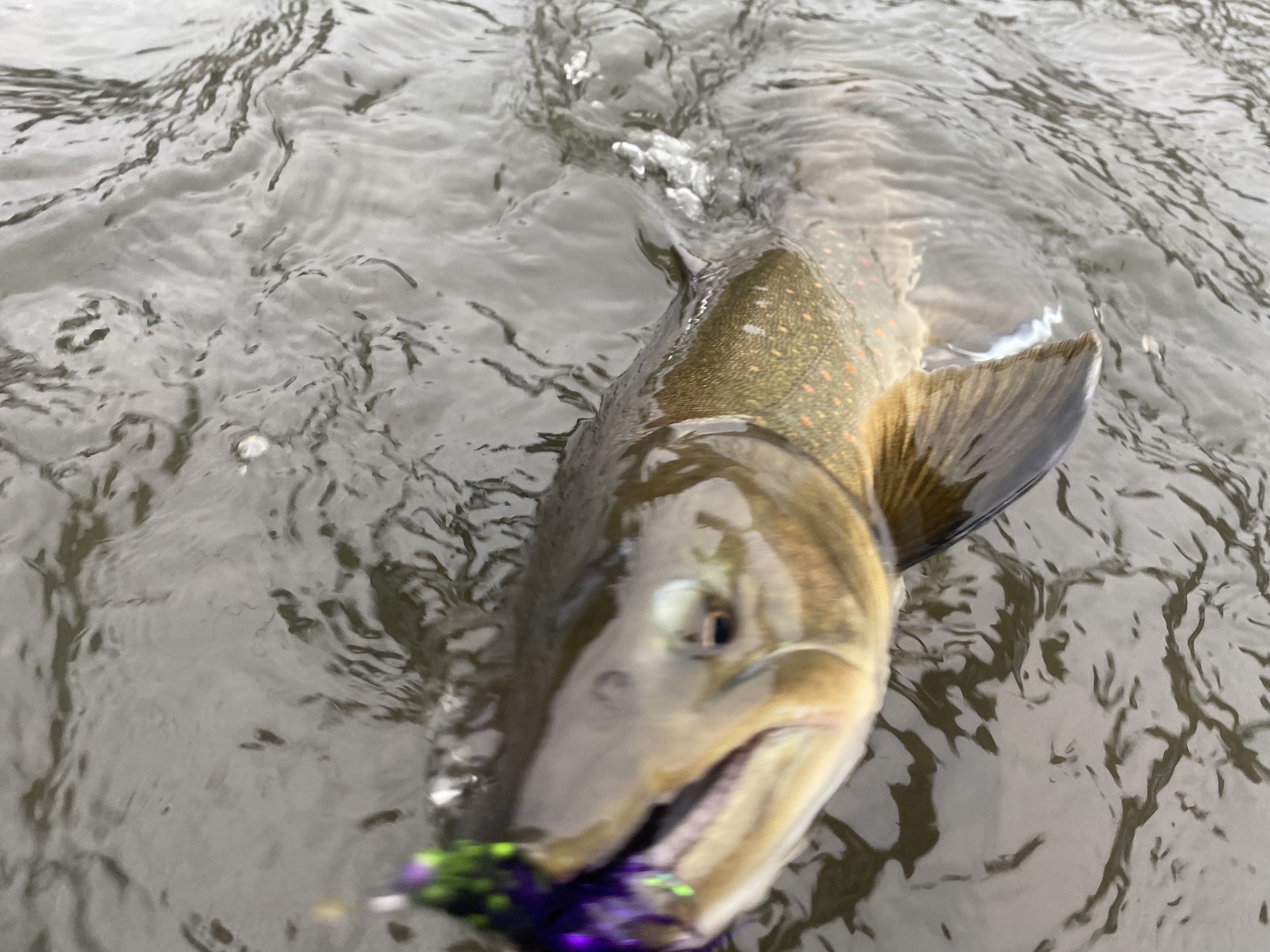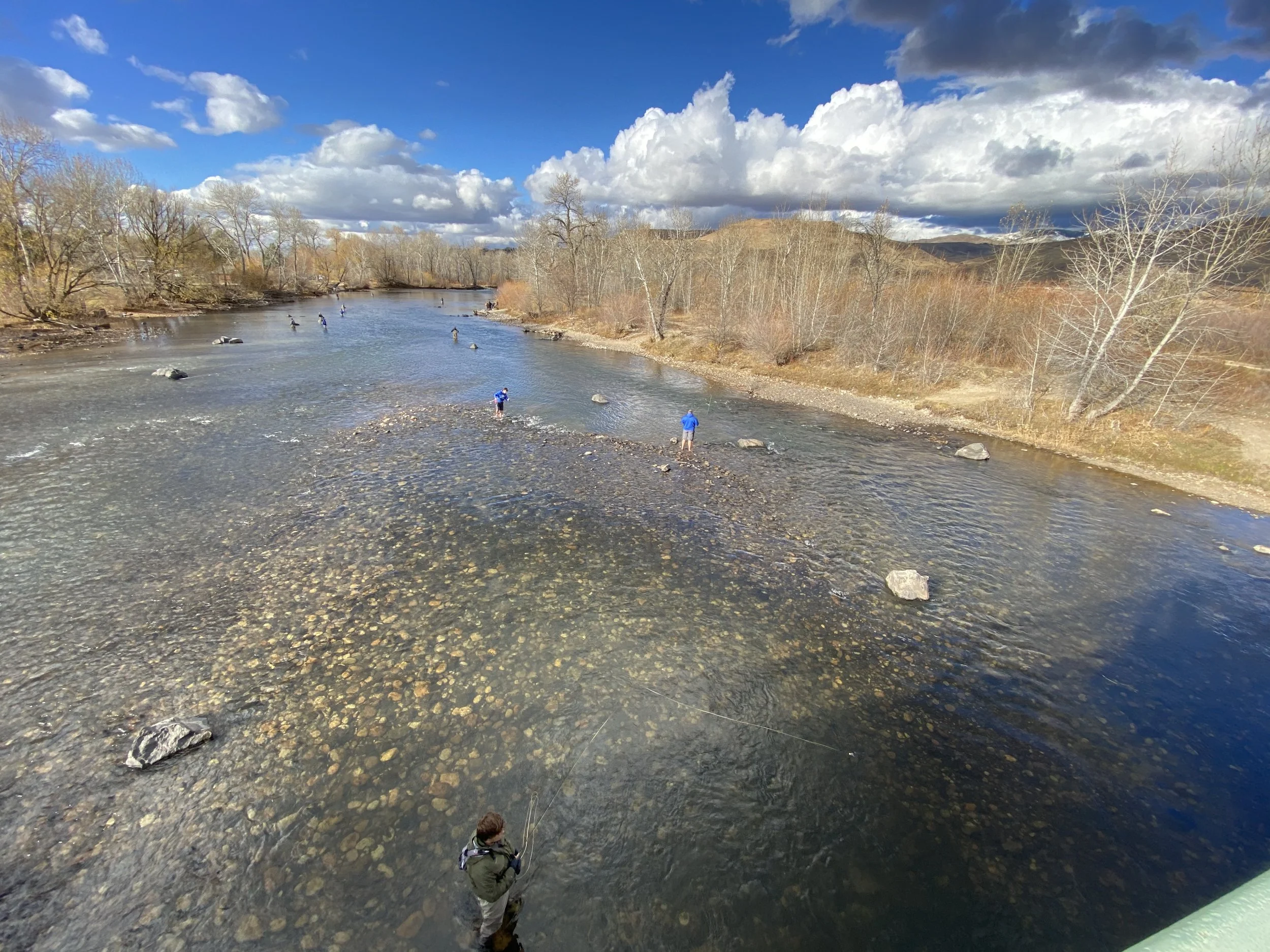Reflections: IWF Accomplishments in 2023
IWF supporters -
Thank you for supporting the Idaho Wildlife Federation. As you know, we work on a myriad of issues impacting Idaho’s fish, wildlife, habitat, public lands, and access to them. Without dedicated supporters staying engaged, IWF couldn't be on the front lines fighting to ensure we retain and enhance our outdoor heritage for current and future generations.
Thanks to the generosity of people like you, IWF has a vast breadth of successful work to showcase from this past year. I’m pleased to share a few of our most prominent successes.
-Brian Brooks, Executive Director, Idaho Wildlife Federation.
Keeping the Rapid River drainage a primitive experience for humans and wildlife.
IWF and hunters came out on top after the Forest Service (USFS) signed their Record of Decision this year protecting the Rapid River drainage from excessive motorized vehicle over-use. Years ago, motorized vehicle advocates petitioned the USFS to open miles of foot traffic trails to mechanized use. The proposed trails would criss-cross the drainage from the existing motorized rim trails, like spokes on a bike, opening the drainage to significant human pressure. This pressure would very likely impact big game herds, jeopardize the quality of the over-the-counter hunting tags available there, and compromise the largest and best remaining aquatic stronghold in the Little Salmon River drainage for chinook, steelhead, and bull trout. IWF mobilized hundreds of hunters, anglers and local residents opposing the petition. In the end the USFS cited the outstanding fishing and hunting characteristics of the landscape, and denied the proposal.
Upland birds and big game get big win on BLM lands
Another big Record of Decision was signed this year, but by the BLM. The Four Rivers Field Office, which includes over 800,000 acres of rangeland from the Bennet Hills to Brownlee Reservoir, completed their Resource Management Plan (RMP) revision process. The RMP, which guides land management for a few decades, was full of wins for wildlife and conservation. After significant grassroots mobilization and after dozens of meetings over the years with BLM staff, IWF and partners were able to reestablish wildlife management prescriptions after they were eliminated. In addition to keeping these important assets, we advocated successfully for Idaho’s first Backcountry Conservation Area (BCA), and the largest so far in the nation. About 120,000 acres, the Bennet Hills BCA will specifically prioritize landscape management for wildlife and wildlife-based recreation. This is a big win for habitat critical for chukar and hungarian partridge, home to sage-grouse and critical wintering habitat for big game.
Salmon and steelhead recovery campaigns reach new heights.
The fight to stop the extinction (and begin recovery) of Idaho’s endangered salmon and steelhead marches onward. IWF has taken on a monumental effort to educate and mobilize grassroots voices in rural, riverside communities on the Salmon and Clearwater Rivers. We remain one of the few organizations who can effectively discuss these tough issues in such places. We’ve flown rural guides and outfitters to DC, taken North Idaho grain growers on flights over the Snake River dams (LSRDs), and continue to ensure fish recovery efforts will leave no one - or industry - behind, including our friends in agriculture and power consumers.
Our efforts have moved chambers of commerce, city councils, and mayors to decry the failed status quo and even to call for breaching the four lower Snake River dams - the single largest human caused mortality contribution of Idaho’s fish - and replacing their power generation and transportation capabilities with alternative mechanisms.
Because the “fix” to reverse the extinction of our anadromous fish involves multiple states, federal waters and dams, and international treaties, it will require a “whole-of-government approach” to turn things around: coordination of federal agencies, congress, state agencies, and even direction from the White House. In that vein, this campaign has come further along in the last two years than in the last 30. Our efforts - and those of our partners - spurred Congressman Simpson to produce his plan to breach the LSRDs and replace their services. Shortly after, Washington state elected officials found the same solutions through their own studies. The National Oceanic and Atmospheric Administration recently stated Idaho’s fish could not recover without breach of the LSRDs. And finally, this year the plight of Idaho’s salmon and steelhead received recognition from the highest office in the land - the US President addressed the dwindling fish populations and directed his executive agencies to assess their failures and rectify them. Though we are far from the finish line, this was a vital step in calling out the federal institutions that have failed to recover our fish.
The work to recover Idaho’s salmon and steelhead continues, but we’ve finally got the attention and direction of decision makers at every level needed to move to the next chapter of this long saga.
2023 Legislative Session Successes
IWF worked on many bills, but two shine as our most impactful successes. First, IWF worked with sporting partners to kill a very bad bill that would have set a season with certain prescriptions on mule deer across the state. Legislators - who are typically not also biologists - should refrain from making emotional or political decisions regarding wildlife. In fact, the very same day sporting and wildlife groups that make up the Idaho Sporting and Wildlife Partnership came to the statehouse for our Camo at the Capitol event, Rep. Shepherd dropped his ill-conceived bill after sportsmen outcry. Second, IWF worked with partner organizations to pass the largest investment in recreation in state history- $95 million to benefit outdoor access. The bill also invested $5 million in a new account similar to the federal Land Water Conservation Fund- a fund to pay for projects that will enhance access to the outdoors such as boat ramps, trails and trailheads, disability access, etc. We expect reinvestments in this fund over the years to serve Idahoans well into the future.
IWF’s fisheries influence expands
IWF sits on several public land collaborative groups, representing sporting and wildlife interests among many varied stakeholders. On the Payette Forest Coalition, the Clearwater Basin Collaborative, the Pioneers Alliance, and more, we work to influence over 15 million acres of public land stewardship that favors fish and wildlife, and quality hunting and fishing. This year we joined two more fisheries focused collaboratives. In North Idaho we stepped up for anglers on the Priest River Watershed Workgroup. In Southwest Idaho, we joined the South Fork Boise Watershed Collaborative. Both basins and their fisheries have vastly different impacts and needs, and we look forward to enhancing fish populations and angler opportunities.
Funding fish habitat recovery.
Every year IWF receives grants to improve aquatic habitat somewhere in the state. This year we won a small grant to complete the restoration of a tributary of the Boise river just outside of downtown. Once completed with new substrate, bank stabilization and native plantings, the stream will provide safe spawning and rearing habitat for trout. The project will also provide volunteer and learning opportunities for children, creating future conservationists and anglers in the process.
Travel Management in the Owyhees and East Idaho.
IWF and our affiliates are working through several travel management plans across BLM lands in Owyhee County and the Upper Snake River BLM region. The amount of recreational pressure on BLM lands in recent decades - and especially the last few years - has skyrocketed. Passive management of off-road vehicles was fine for years, but the amount of use and pressure public land receives today necessitates active management via travel management planning processes. Maintaining access to public land is key to the sporting public, but access to public lands is defined across a spectrum. To find balance, IWF is bringing along local stakeholders and sportsmen to provide reasonable access to areas while conserving open, unfragmented landscapes that provide unparalleled hunting opportunity across the state.We will continue to be the sporting voice throughout the travel management planning process to maintain that balance Idahoans deserve.
Photo Copyright Angie Smith Courtesy United Payette
Keeping Payette Lakes and lands in public hands.
This campaign began in 2020 when Trident, LLC proposed to privatize 28,000 acres of state land surrounding both Payette lakes- treasured for fishing, hunting, and recreation. Trident is by the wayside, but the effort to keep these lands and waters in public hands goes on. Shepherded by a coalition of conservation groups called United Payette, which includes IWF, the USFS is working to trade these lands with the State of Idaho, which will preserve 95% of the landscape. To keep these state parcels open to the public until a permanent solution is found, United Payette successfully negotiated a first-of-its-kind lease of state lands specifically for keeping open their use for public recreation, fulfilling their constitutional mandate to maximize long term revenue while preserving public access and this quality habitat.
Facilitating wildlife-wise renewable energy transition on public lands.
Interest in developing utility scale renewable energy on Idaho’s public lands has skyrocketed in recent years. In 2023, IWF pioneered the creation of the Idaho Sporting and Energy Coalition, a coalition of sporting and wildlife organizations that meets regularly with federal agencies and the Governor’s office to ensure that renewable energy project siting avoids sage-grouse breeding areas, big game migration corridors and wintering habitat, and important landscapes for hunters and anglers. IWF continues to work with the Governor's office, state and federal agencies to set a framework for the future that ensures high priority wildlife areas are avoided by large scale renewable energy
Wild Eats: Celebration of WIld Game series
In 2023, IWF hosted two of what are sure to be many of its WILD EATS: A Celebration of WIld Game Series. Volunteers brought their hard earned and delicious big game, birds and fish dishes for the crowd at Clairvoyant Brewing to enjoy.
Cody Montgomery
Sandpoint, ID
Brett Garamendi
Garden City, ID
CONSERvation ambassador program continues to expand
IWF’s Conservation Ambassador program grew by two members in 2023, with the addition of Cody Montgomery from Sandpoint, ID, and Brett Garamendi from Garden City.
IWF Affiliate network continues to grow
In 2023, IWF grew it’s esteemed network of sporting Affiliates around the state with the addition of the Chukar Chasers and the North Idaho Fly Casters.
Learn more about what it means to be an IWF Affiliate by visiting IdahoWildlife.Org













